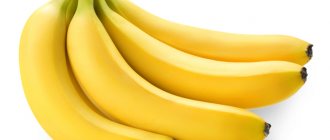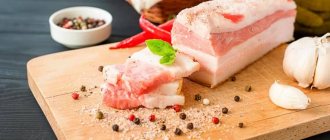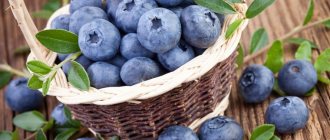Properties of coconut milk
Nutritional value and composition | Vitamins | Minerals
How much does coconut milk cost (average price for 1 liter)?
Moscow and Moscow region.
280 rub.
Coconut milk is a sweet, milky-white liquid obtained from the flesh of a mature coconut. By the way, this product first appeared in Thai cuisine, where it began to be used as an alternative to dairy products of animal origin, which the local population neglects. The calorie content of coconut milk is 152 kcal per hundred grams of product.
Do not confuse coconut milk with coconut water or juice, a natural liquid that forms naturally in the cavity of the fetus. In contrast to this product, coconut milk is made artificially - the coconut flesh is grated, and then the resulting pulp is squeezed through cheesecloth. Depending on the number of squeezes, the final product can be either quite liquid or very thick. For example, after the first squeeze, coconut milk is obtained with a thick consistency, and when the used pulp is soaked in water and squeezed several more times, the resulting milk resembles ordinary white water.
Dishes based on coconut milk are popular all over the world, particularly in Thailand, where everyone loves soup based on this product, which is usually served in the coconut itself. In Indonesia, Malaysia and Brunei, coconut milk is called santan, while locals in the Philippine Islands call it gata.
Coconut milk, which has a rich, soft and delicate taste, is also loved by Europeans: it is incredibly popular in France. There, chefs call it Asian cream, since thick coconut milk contains a considerable amount of oil and fat. Along with its excellent gastronomic qualities, the beneficial properties of coconut milk are also especially appreciated.
In cooking, this product is the basis for preparing certain types of sauces for fish and meat dishes, as well as sweets and desserts. Coconut milk with a thick consistency is mainly used for these purposes. More liquid coconut milk is used to make non-alcoholic and fruit cocktails and a variety of soups. In addition, it is often added to main courses and salads.
How to choose?
Before buying a can of coconut milk, you should study the composition of the drink indicated on the packaging (tin can or cardboard box). A quality product does not contain any other ingredients other than coconut pulp and water. If the composition contains an antioxidant such as E-224, which is added to prevent the fermentation process, then you should not buy milk, since E-224 is a dangerous carcinogen. You also need to pay attention to the integrity of the packaging and shelf life. If the packaging is damaged, the stated expiration date is no longer valid.
Benefits of coconut milk
In addition to its delicate taste, the benefits of coconut milk for human health are also known, since this product is rich in oils, vegetable fats and protein. In addition, it is rich in ascorbic acid, B vitamins, manganese and iron. Coconut milk has a low calorie content, so it is often recommended for chronic fatigue, vitamin deficiency and loss of strength.
Regular consumption of coconut milk has been found to reduce the development of certain cardiovascular diseases. The benefits of coconut milk have also been proven for those suffering from nervous disorders and depression. It is recommended to drink this product for urological disorders, as well as for problems with brain activity.
How to store after opening the jar?
To prevent premature deterioration of the product after opening the package, certain storage conditions and expiration dates must be observed.
Conditions
The most suitable storage condition for coconut milk is to place the drink in the refrigerator on a shelf intended for dairy products. If the product was purchased in a tin can, then it should be poured into an airtight glass container.
A store-bought drink can be stored in the refrigerator for no more than 3 days; homemade coconut milk should be used up within 1-2 days.
Coconut milk can be frozen, for example by pouring it into ice cube trays, and then used to make smoothies. Alternatively, you can place the milk directly in a tin in the freezer compartment. In this case, the shelf life of the product will be 1 month.
What are the benefits of tropical fruit?
We have already become acquainted with the calorie content of coconut, now we understand that its beneficial properties are extremely high.
Coconut oil and milk have a beneficial effect on vision, restore strength, this is very important for older people and those who have diseases of the visual system.
- The exotic fruit restores the immune system, allows you to resist infections and viruses, so eating it is useful for colds, infectious and viral diseases.
- The oil obtained from the pulp nourishes the hair, prevents the appearance of wrinkles, smoothes the skin, and is used in the manufacture of cosmetic and medicinal creams, compositions, and gels.
- The coconut fruit also provides intensive assistance for pathologies of the liver, digestive system, and thyroid gland.
- Lauric acid promotes the production of breast milk; nursing mothers simply need to consume coconut products.
- In addition, this acid normalizes cholesterol levels in the blood and has a beneficial effect on the cardiovascular system.
- Walnut minerals prevent cancer pathologies, have diuretic and choleretic properties, promote rapid wound healing, and fight microbes and worms.
- An important product for AIDS, it can resist lichen formations.
- Men can eat the product to increase reproductive activity; this quality of the fruit was used in ancient times, when people had not heard of medications. The fruit is also good for children, but it must be used after 3 years.
- Many women are interested in whether it is possible to eat coconut at night. Yes, a small amount of nut can serve as both a snack and a light nutritious dinner.
How to make coconut milk at home from coconut and shavings
If necessary, you can prepare a healthy drink yourself, which guarantees its quality and naturalness.
How to do it:
- Select a tropical nut without signs of damage.
- Cut the fruit and remove the pulp.
- Grate it on a fine grater.
- Pour water into the mixture to cover.
- Leave for 2 hours.
- Add a little vanilla and 30 ml of liquid honey to the resulting product.
- Mix thoroughly, beat with a blender at maximum speed for 30-40 seconds.
- Strain the milk through multilayer gauze.
- Leave the pulp cake for re-cooking.
Storage time in the refrigerator is 2 days.
Application in cosmetology
Thanks to its antioxidant properties, it prevents premature skin aging. Cosmetics companies use it to produce hair and skin products.
Antibacterial properties prevent rashes on the face, such as pimples, blackheads.
Used to cleanse pores instead of lotion. Milk:
- Gently removes remnants of cosmetics, fat and dirt on the face;
- Moisturizes the skin;
- Gives softness and elasticity;
- Improves skin tone and color;
- Has an exfoliating effect.
Relieves pain, dryness and burning after prolonged exposure to the sun. Simply apply a cloth soaked in milk to the damaged skin and leave overnight.
Suitable for hair care. Vitamin E, fats moisturize and nourish hair. Improves growth, preventing hair loss.
Masks with coconut milk will help deal with dandruff.
Origin and description
For some citizens in our country, this fruit still retains its mystery. What is the benefit of the snow-white pulp and delicate transparent milk of coconut? And should you be careful when consuming this overseas delicacy?
It is believed that knowledge about coconuts came to us from Indonesia, Brazil, Thailand and the Philippines. In addition, the name of the palm tree has Portuguese roots. The word "coco" means "monkey" in Portuguese. The fact is that three spots on the surface of the fruit are very similar to the face of a monkey.
What does it consist of?
It belongs to the Palm family and the genus Cocos (being its only representative). The coconut nut is mistakenly called. From the biological side, this fruit is a drupe by type, weighing up to 2.5 kg.
Under the shell there is endosperm and white pulp with a unique valuable composition. At first, the endosperm is a clear liquid with drops of oil - coconut water. During the ripening process, the water becomes coconut milk - a milky emulsion. In a finally ripened coconut, the milk thickens and becomes hard.
Calories and nutritional value
Fruit pulp 100 g. contains approximately 360 kcal . The calorie content of coconut water is almost zero (per 100 g - 16.7 kcal). Nutrient content per 100 grams:
| Name | Squirrels, gr. | Fats, gr. | Carbohydrates, gr. | Glycemic index |
| Pulp | 3,33 | 33,49 | 15,23 | 45 |
| Milk | 4 | 27 | 6 | 40 |
Harm of coconut
People with individual intolerance to this product should avoid eating coconut. It is imperative to reduce the amount of coconut pulp eaten if you are prone to weight gain or diarrhea.
Read: Calorie content of mackerel per 100 grams
Due to its high fat content, coconut is contraindicated for pancreatitis, cholecystitis, inflammation in the liver, stomach and intestines.
SUBSCRIBE TO SITE UPDATES
IT IS VERY INTERESTING!
- Benefits, harms, calorie content of lemon per 100 grams
- Benefits, harms, calorie content of rye bread per 100 grams
- Benefits, harms, calorie content of lime per 100 grams, 1 piece.
- Benefits, harms, calorie content of papaya per 100 grams
- Benefits, harms, calorie content of apricots per 100 grams
- Benefits, harms, calorie content of kumquat per 100 grams
- Benefits, harms, calorie content of blackberries per 100 grams
- Benefits, harms, calorie content of tomatoes per 100 grams
Chemical composition
The composition of the product is very diverse. It contains vitamins, amino acids, macro- and microelements, and plant fiber.
Main components:
- Vitamins (A, group B, C, E, PP, K). Vitamins increase hemoglobin synthesis, activate regeneration processes, strengthen the body's immunity, which reduces its susceptibility to the effects of harmful microorganisms.
- Macroelements (calcium, magnesium, potassium, phosphorus, sodium). The presence of these components improves the functionality of muscle tissue, the transmission of impulses in the nervous system, and also normalizes the process of blood clotting and blood pressure levels.
- Microelements (manganese, selenium, iron, zinc, copper). Their content activates collagen synthesis, prevents the growth and further development of abnormal cells, improves air exchange at the cellular level, normalizes the functioning of the reproductive organs and is involved in the synthesis of red blood particles.
- Essential and nonessential amino acids (leucine, lysine, arginine, serine, proline, threonine, isoleucine, valine, methionine). The presence of these components helps cleanse the liver of toxins, synthesize growth hormones, enhance brain activity, improve memory and human concentration. Amino acids also increase resistance to pain and temperature changes.
- Plant fiber. This component helps normalize metabolic processes, reduces the content of bad cholesterol in the body, normalizes blood sugar levels, and maintains healthy microflora in the intestines.
- Polyunsaturated acids (Omega-3, 6, 9 group) . They help reduce the likelihood of developing cardiovascular pathologies, rheumatism and cancer.
- Fatty acids (lauric, palmitic, stearic, capric). The presence of these substances has a beneficial effect on the functioning of the digestive organs. They also strengthen the body's immunity.
Where can I use it?
Coconut milk is used in:
- Cooking;
- Cosmetology;
- In folk medicine.
Local peoples, where coconut is not an exotic plant, use milk to gargle for sore throats. Its ability to heal oral ulcers is noted.
As a product containing water and fiber, it is used in the treatment of constipation.
Recommended for:
- Anemia;
- Decreased vision;
- Decreased bone density (osteoporosis);
- Hypertension.










